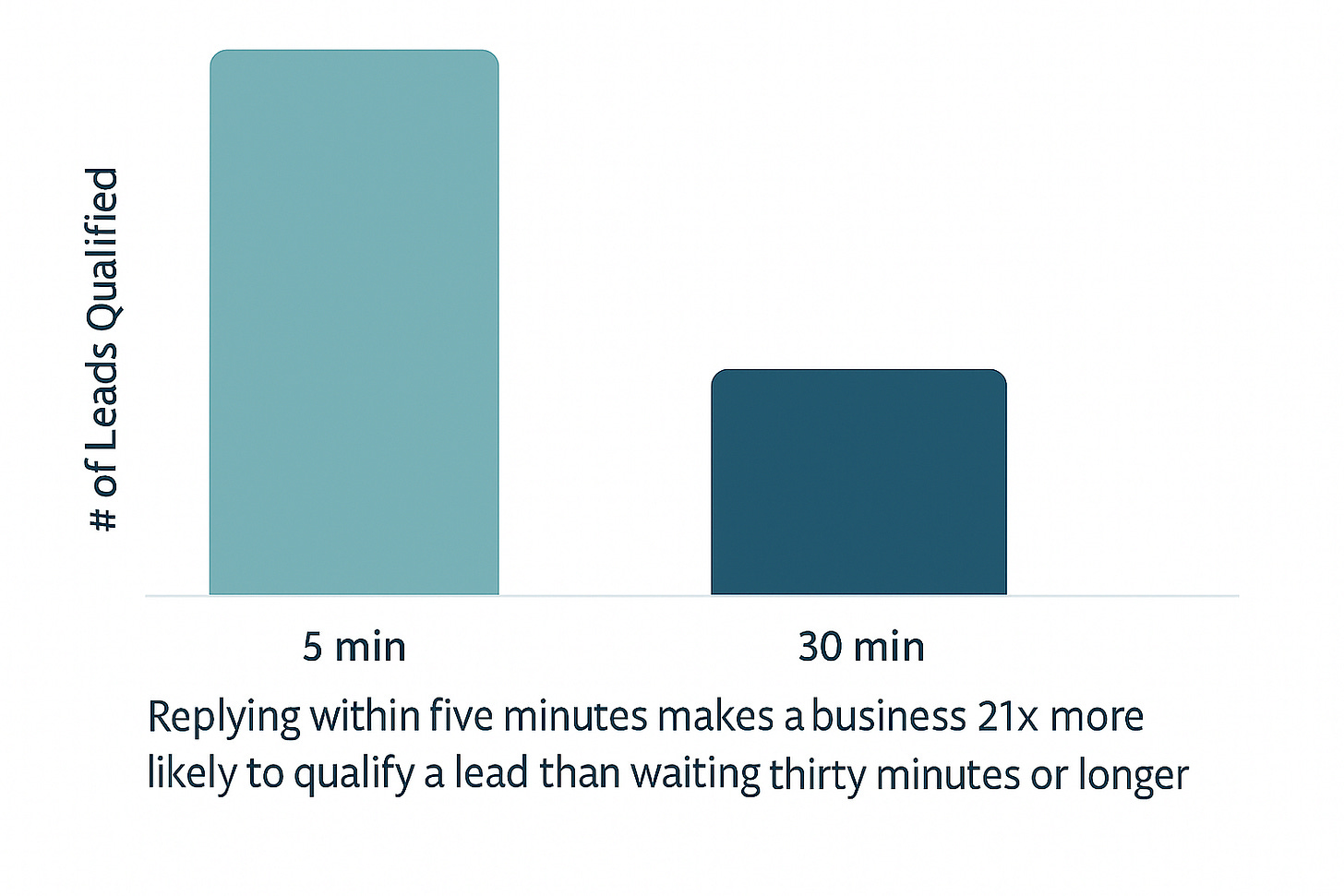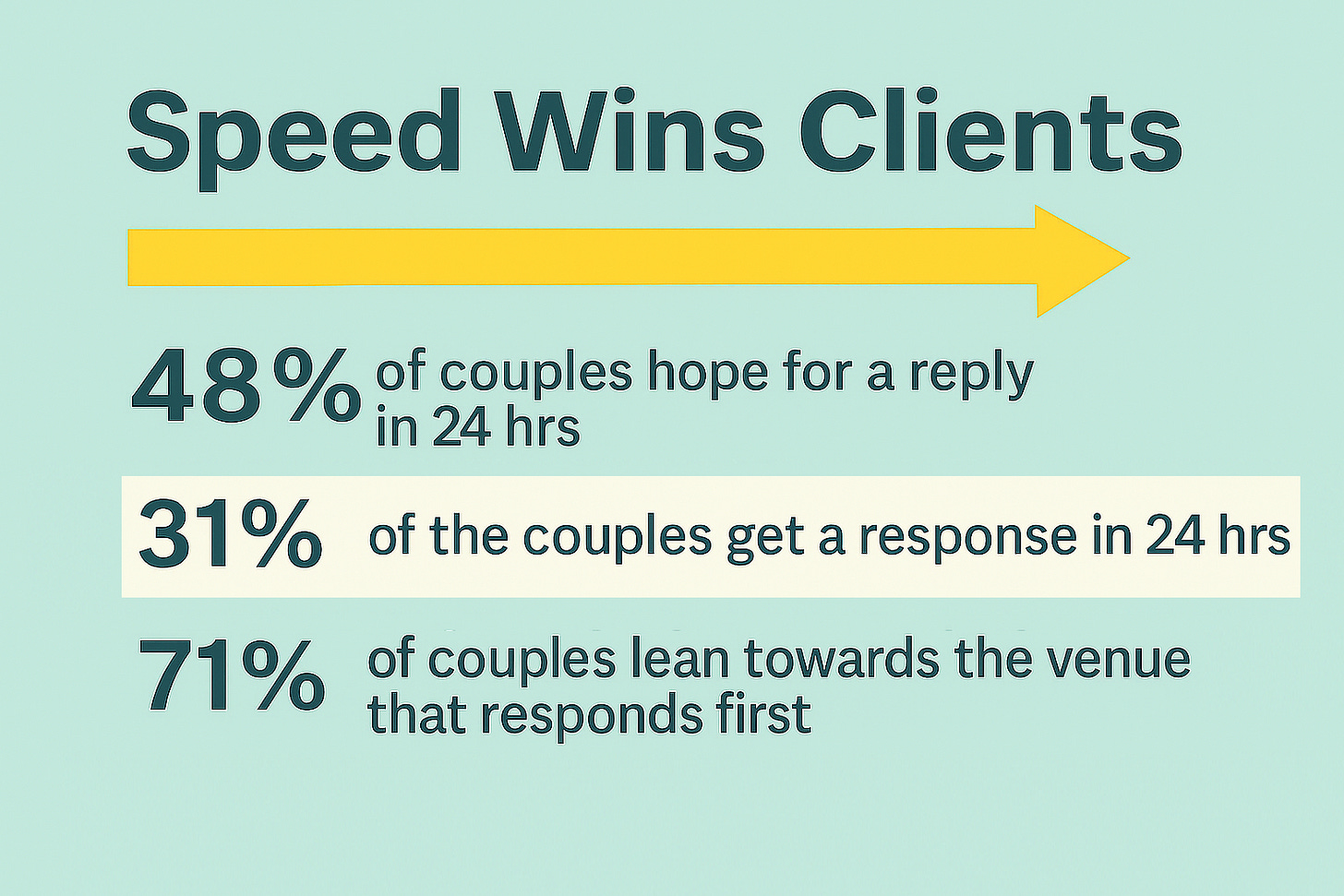From Leads to Bookings: The Fastest Way to Grow Your Event Revenue This Year
How event pros are growing revenue without adding more ads, staff, or hours—thanks to AI-powered sales systems
What You’ll Take Away From This Guide
From Growth Guesswork to Growth Formula: Why more ads and bigger budgets aren’t always the answer.
Conversion Is the Quiet Multiplier: Double booking revenue by tightening reply times, follow-ups, and proposal workflows.
AI as Your Sales Co-Pilot: How AI tools are reshaping response speed, proposal quality, and follow-up consistency across the industry.
The Hidden Cost of ‘More Leads’: Why chasing new traffic without fixing conversion is like pouring champagne into a cracked glass.
Pricing Power: How raising rates can pay off—but not without risk.
Increasing conversion rates is #1: Why is this the most cost-effective growth lever?
Your Next Step: Let us know what you think—and grab a seat for our upcoming “How to Make AI Sound and Act Human” webinar.
Why Is This Relevant?
According to a WeddingPro industry study, the average inquiry-to-booking rate for wedding and event venues falls between 5 - 10%.
48 % of engaged couples hope to hear back the same day, but only 31% actually get a response during that timeframe.
Research by The Knot found that 71% of couples consider a vendor or venue’s responsiveness a top factor when deciding whom to book.
Every unanswered ping is a potential event walking into your competitor’s inbox.
That gap between expect-to-hear and actually-heard? It’s your hidden profit leak — and it’s where AI sales assistants quietly add back tens of thousands in lost bookings each season.
(Estimated read time: 9 min | 1,720 words)
1 | Three Revenue Levers—and Why Most Teams Pull the Wrong One
Strip every growth strategy down to its economics, and you get only three levers that move top-line revenue:
More leads: Expand your pipeline through ads, listings, or partner channels.
Higher prices: Lift your average booking value by strengthening brand positioning, refining packages, and aligning pricing with market demand.
Better conversion: Turn a larger percentage of inquiries into booked events.
It’s no surprise that most venue teams default to the first lever—“we need more leads.” It feels visible and measurable. And with the global events industry projected to reach $2.1 trillion by 2032, it’s easy to assume growth is simply a function of volume.
But here’s the paradox: despite rising ad spend and higher listing fees, industry-wide inquiry-to-booking ratios have barely moved. The problem isn’t lead flow—it’s lead friction. Every additional inquiry adds operational drag: more replies, more back-and-forth, more context-switching—until speed and quality collapse under their own weight.
Research shows that replying within five minutes makes a business 21× more likely to qualify a lead than waiting thirty minutes or longer.
That’s the real bottleneck: throughput, not traffic. The marketing pipeline isn’t broken—the sales system is.
Conversion efficiency is the hidden lever that compounds every dollar you already spend. It raises your effective ROI, doesn’t require new headcount, and delivers faster wins than any paid campaign.
Fixing response time and follow-up consistency can outperform an entire season’s ad budget, because it captures the revenue hiding in leads you’ve already earned.💰
2 | Convert More of What You Already Have—The Fastest Growth Engine
The real growth engine isn’t always about more leads or higher prices—it’s about better converting the leads you already have.
In vendor terms: fast replies (5 minutes or less), consistent follow-ups, and organized communication across every channel fill the gaps between an inquiry and a booking. When you boost just one metric—like first-reply time—you increase your booking yield without spending more on leads.
Some AI tools claim that after enabling AI Sales Assistant, they saw 30-50% more bookings. So if you’re making $90,000 in revenue, this could mean extra $27,000 - $45,000 in your bank account from the leads you’re already getting.
🧠 Fixing conversion is lower-hanging fruit because it uses your existing assets. Improve your throughput, reduce administrative drag, and your ROI on current spend goes up—often faster than any new marketing campaign.
3 | Enter AI-Sales Assistants: Why They Matter
The fastest-growing venues in 2025 aren’t hiring bigger teams—they’re enabling AI sales assistants that work with their existing systems.
Reply speed isn’t just a nice-to-have; it’s the most underused conversion lever in the industry. Businesses that reply to leads within five minutes are 21× more likely to qualify them than those that wait longer. That delta—between “replied quickly” and “replied two days later”—is your profit leak. AI sales assistants close it.
Instead of your team juggling with forms, DMs, and inboxes, these Ai sales assistants respond fast, qualify intent, and keep prospects engaged while your team focuses on closing. They don’t replace the human closer—they clear the runway for them.
What modern AI sales stacks deliver:
Almost instant replies across email, phone, chat, and SMS
Real-time date availability checks through synced calendars
Dynamic proposals with accurate pricing reflecting guest count, season, and add-ons
Automated smart follow-ups that pauses once a lead books a date, or goes inactive
Branded tone that sounds like you, not a bot
Every minute saved in response time is a compounding gain in conversion. The shift isn’t theoretical—the AI tools are already reshaping venue and vendor sales across the industry. ⏳
The Current Players:
Breezit AI
Breezit AI claims that their AI sales assistant has helped venues and vendors achieve 50 % more bookings and save 20+ hours per week on admin work. Their AI replies to phone inquiries are immediate, and emails or texts go out within 1–5 minutes, averaging about 2.5 minutes.
⚙️Key Features:
Omnichannel coverage 24/7 with personalized replies
Live calendar sync for availability and tour/calls booking
100 % accurate and branded proposals generated automatically
Automated smart follow-ups across channels
Q&A support for every inquiry
Easy integrations with existing CRMs
Streamlined contract-to-payment process
🚫 Where It Falls Short:
Does not yet offer a dedicated mobile app
VenueX AI
VenueX AI markets itself as a 24/7 engagement assistant that helps venues capture after-hours inquiries through personalized replies. While it emphasizes constant availability, it doesn’t disclose reply-time benchmarks or specific booking uplift percentages on its website.
⚙️ Key Features:
Email, text, and website chat communication
Smart follow-ups for leads
Calendar sync for instant tour scheduling
Email & SMS campaigns to request reviews
Q&A support
🚫 Where It Falls Short:
No contract or payment processing support
Lacks phone answering and social media coverage
Proposal generation accuracy unclear; AI method not specified
Does not handle CRM integrations
VenueAI
VenueAI positions itself as an AI sales assistant built to increase qualified tour bookings, promising potential boosts of up to 50 %, although the company cites proven results of 10–20% among clients already using its platform. While it emphasizes the importance of instant lead responses, their average is 4 to 5 minutes.
⚙️ Key Features:
Text and email responses to inquiries
Venue-specific tone & FAQs
Smart follow-up sequences
Tour scheduling directly into calendars
CRM integrations
Q&A support
🚫 Where It Falls Short:
Phone call coverage is not enabled yet
Proposal generation lacks clarity—their website does not detail how proposals are created
No contract or payment processing support
Primarily focused on venues, not broader vendor categories
For most event businesses, the fastest wins come from breadth and speed—systems that capture, qualify, and follow up automatically while keeping the human closer in control.
The technology doesn’t just answer faster; it multiplies your conversion efficiency without adding headcount. 🤖
4 | Lead Generation: Useful But Expensive
Marketing still matters—every vendor needs visibility. But chasing more leads isn’t the same as growing revenue.
Each new inquiry looks like an opportunity, yet behind the scenes it also adds clutter: more emails to answer, more DMs to check, more follow-ups to juggle. Without a system built to handle that volume quickly and consistently, more leads just mean more work—not necessarily more bookings.
And unless your conversion process is 100% effective, much of your investment in lead generation evaporates long before it ever turns into revenue.
The truth is, most vendors don’t have a lead problem; they have a conversion problem.
Lead generation grows reach. Conversion systems grow revenue. ✅
5 | Raise Your Pricing: A Solid Lever—With Caveats
Price is a powerful lever—but only when the market and experience can support it.
The average cost of a wedding venue in the U.S. is $12,200, up roughly 5 percent year-over-year. At the same time, operating expenses for wedding-services businesses rose, driven by staffing and supply costs. Margins are tightening even as demand holds steady.
That means a 10–15 percent price increase can lift revenue only if your booking conversion rate remains stable. When response times slow or follow-ups lapse, higher prices often backfire.
In short: raise perceived value before you raise your rates. A faster, more consistent conversion system keeps your premium pricing credible—and your calendar full. 🎉
6 | Why Conversion Should Be Priority #1
Most vendor teams instinctively chase lead volume because it feels like progress—more ads, more inquiries, more noise. But in practice, volume without velocity rarely drives growth.
Across the industry, marketing budgets keep rising, yet the percentage of inquiries that turn into booked events remains stubbornly low. The pattern is clear: visibility isn’t the problem—velocity is. When response times drag or follow-ups lose consistency, the return on every ad dollar starts to decay. Until conversion systems catch up with marketing spend, most venues will keep paying more just to stand still.
Meanwhile, venues or vendors that integrate automated follow-ups or sub-five-minute responses can boost qualified lead rates from 30% to 50%. The math is simple: improving conversion speed is cheaper, faster, and more scalable than buying more traffic or gambling on price elasticity.
In short:
More leads = more costs (ads, listings, management, staff).
Higher prices = riskier if conversion drops.
Better conversion = higher yield from the same input.
When every inquiry costs money, the smartest growth play isn’t feeding the funnel—it’s sealing the leaks. AI-assisted sales systems aren’t just a productivity win; they’re a profit-margin strategy. 🤝
7 | Join the Conversation 🚀
💬 You’ve seen the numbers. You’ve seen the pattern. Nowadays, the venues growing fastest aren’t chasing new leads—they’re converting the ones they already have, faster and smarter. Share your inputs of questions in the comments.
🚀Ready to make AI sound (and act) more human?
Join our upcoming webinar, “How to Make AI Sound and Act Human When Communicating with Your Leads.”
Click here to sign up and get an early heads-up when the webinar goes live.
Until next time—keep replies fast, follow-ups fluent, and those deposit invoices stacking high. 🥂
— FutureBooked





